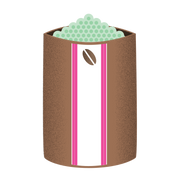Quarter Horse Coffee Club
Exclusive coffees for ✛ Plus plan subscribers

Coffee Profile

Varietals
Bourbon

Process
Washed

Producer
Smallholder farmers

Notes
Caramel, Red Cherry & Brown Sugar
More about the coffee, producer & region.
Sholi Kundwa Coffee is exclusively sourced from the smallholder farmers comprising Kundwa Women Coffee, a dedicated women-only producer group operating under the umbrella of the Abateraninkunga Ba Sholi (Aba Sholi) Co-operative. The Abateraninkunga Ba Sholi Co-operative (or Aba Sholi Co-op) is situated in the Cyeza sector of the Muhanga district, located in central Rwanda. Established in 2008 by an initial cohort of 30 women residing and cultivating coffee in the region, the co-operative emerged as a proactive initiative to stimulate the local economy. Initially, coffee cultivation represented a minor aspect of the association's activities, constrained by the absence of a viable market for coffee cherries due to the lack of local processing infrastructure. This landscape shifted in 2010 when the association's mission evolved, culminating in its formal establishment as a cooperative. Subsequently, the co-operative experienced steady growth, incorporating new members annually, and in 2014, Aba Sholi inaugurated its own washing station, a pivotal development for their operations.



About the Region
The Kinyarwanda term "Abateraninkunga," translating to "mutual assistance," underpins the cooperative's values and its objective of expanding membership among local coffee farmers. Currently, the cooperative comprises 610 producers, a significant proportion of whom are women, cultivating coffee at elevations ranging from 1,800 to 2,000 meters above sea level (masl). Demonstrating a commitment to ethical and sustainable practices, the cooperative achieved Fair Trade certification in 2015. This same year marked a significant achievement in quality recognition, as the cooperative was awarded the prestigious Rwanda Cup of Excellence.
About the Process
Ripe cherries are carefully selected, first by hand sorting then by floatation to remove under-developed cherries (floaters). The cherries are then depulped and wet-fermented for 15-18 hours, typically overnight, to break down the remaining mucilage. After fermentation, the wet parchment is washed by high pressured water and grading is done throughout long channels to separate coffee by density. During this grading stage, coffee beans pass through a series of gates that allow less dense, lower quality beans to flow through, while retaining the denser, higher quality beans for separate processing in top lots such as this. The retained washed beans are moved from channels to pre-drying tables, where they are carefully sorted under shade for around 4 hours. Next, the beans are taken on raised drying tables numbered for around 14 days in warm days or 21 days in rainy days. The coffee is also sorted again for defects, any damaged beans and it is turned regularly by women (seasonal workers) and the latter are tasked to protect coffee from rain or the midday sun by using covers.
How can I get this coffee?
Available exclusively in April on our ✛ Plus QHC Club Membership
Join our QHC Club today...








